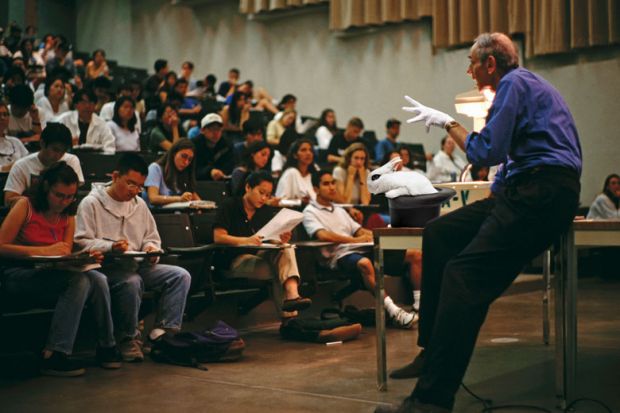When trying to identify good practice in teaching, it is generally a bad idea for academics to look back on their own experience as undergraduates, however magical it was. For one thing, we were often not particularly typical students, and, at least in my case, it all happened a long time ago, in a very different world.
However, some things have not changed all that much. Like most students today, when I arrived at university I had no experience of sitting in a large lecture theatre with a couple of hundred other students while someone talked at us for an hour. I had no basis for deciding whether it would be a good way for me to learn and, in retrospect, I can see it had many drawbacks. For many of the neuroatypical students, in particular – who were almost completely undiagnosed at the time – it must have been dire.
THE Campus resource: The active lecture - student-centred learning for the future
In my case, the real benefit of lectures probably came from their imposition of a structure on my education; I could, in principle, have learned much the same things from handouts and textbooks, but it is very unlikely that I would have had the maturity to do so effectively. Yet it wasn’t just that. There was also something intangibly engaging about the experience of being in a lecture. The way the buzz of conversation would fade to hush on the hour, as 100 brains clicked into concentration mode, made you feel genuinely part of a learning community. Our shared amusement at the lecturer’s mistakes and mannerisms only enhanced the sense of camaraderie, both with fellow students and even with the lecturers themselves, in the joint enterprise of learning.
It has become fashionable to denigrate the lecturer as an outdated “sage on a stage”, but there is surely something deep-seated in our species’ evolution that makes live storytelling an effective vehicle for passing wisdom between generations. This is why it has survived the rise of the printing press and the personal computer. Of course, the internet has moved things on, and I now have some experience of presenting physics through the Sixty Symbols YouTube channel. But it is notable that a significant part of that channel’s success comes down to the videographer standing in as a proxy for a live audience.
Even so, a recorded lecture or demonstration is a rather different experience for the viewer. In a live lecture, while there is an asymmetry between teacher and taught, even a large audience will not just be passive individual recipients: a good lecturer picks up on the level of engagement and comprehension and adjusts the narrative accordingly – and becomes a better lecturer by tapping into the collective energy that a sizeable, focused audience generates.
As a lecturer, I hope I have played my own part in amusing students with my foibles and even the occasional conjuring trick, and I have experienced from the other side that feeling of a mutual learning enterprise in which we are all stakeholders. Yet that feeling has been in short supply recently. It was already fading in England pre-Covid, with high fees making students develop a quite understandable sense of entitlement to be passive customers rather than participants. The advent of widely available video capture of lectures left us with half-empty lecture theatres, and those students who did attend felt as if they were at an unpopular matinee. Their apathy deprived the lecturer of the collective feedback of an engaged audience, generating ever less motivation for both parties to even show up as term went on.
While some individual students might well benefit from being able to watch videos of lectures at home at a time that suits them, the loss of the collective energy of a thriving lecture theatre affected many, even if they were unaware of what was missing. With the wholesale move to online teaching during the pandemic, the benefits of the shared experience all but disappeared. Talking to myself in online “engagement sessions”, faced by a sea of blank cameras, was a soul-destroying experience and cannot have been any more fun for the students. While small-group dialogue worked significantly better over the computer, it intrinsically lacked that mass-audience buzz. Yet since the return of some semblance of normality, we have still struggled to get a significant number of students to re-engage with the live in-person lectures that we resumed offering – often in response to calls from students.
I am not going to argue that everyone should be forced to attend everything in person whatever their circumstances, or even that lectures are the best and only way to educate. But I do think that we have lost an important aspect of the rather nebulous way in which university education used to work as a shared, lived experience. We should be thinking hard about how to put some of that magic back.
Michael Merrifield is professor of astronomy at the University of Nottingham and former head of its School of Physics and Astronomy. He contributes regularly to the Sixty Symbols YouTube channel.
Register to continue
Why register?
- Registration is free and only takes a moment
- Once registered, you can read 3 articles a month
- Sign up for our newsletter
Subscribe
Or subscribe for unlimited access to:
- Unlimited access to news, views, insights & reviews
- Digital editions
- Digital access to THE’s university and college rankings analysis
Already registered or a current subscriber? Login








